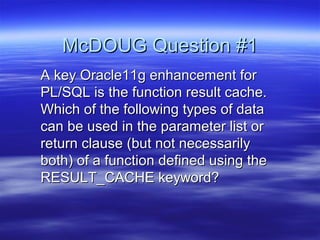PL/SQL11g Question #1
- 1. McDOUG Question #1 A key Oracle11g enhancement for PL/SQL is the function result cache. Which of the following types of data can be used in the parameter list or return clause (but not necessarily both) of a function defined using the RESULT_CACHE keyword?
- 2. Your Choices? 1. Cursor variables 2. Nested tables and varrays 3. Associative arrays 4. Object types 5. Large objects (BLOB, CLOB, BFILE) 6. Records (user-defined and %ROWTYPE) 7. Scalars (numbers, dates, strings, Booleans)
- 3. Answer You cannot use any of the following datatypes in either the parameter list and RETURN clause of a function that includes the RESULT_CACHE clause: ÔÇß Large objects (BLOB, CLOB, BFILE) ÔÇß Object types ÔÇß Cursor variables ÔÇß If you try to use these anywhere in the function header, you will get this compile error: PLS-00999: implementation restriction (may be temporary) RESULT_CACHE is disallowed on subprograms with IN parameter of (or
- 4. Continue ÔÇß You can, on the other hand, return the following types of data (but they may not appear in the parameter list of the function): ÔÇß Associative arrays ÔÇß Nested tables ÔÇß Varrays ÔÇß Records (user-defined and %ROWTYPE)
- 5. Restrictions on Result-Cached Functions ÔÇß To be result-cached, a function must meet all of the following criteria: ÔÇß It is not defined in a module that has invoker's rights or in an anonymous block. ÔÇß It is not a pipelined table function. ÔÇß It has no OUT or IN OUT parameters.
- 6. Restrictions on Result-Cached Functions  No IN parameter has one of the following types: – BLOB – CLOB – NCLOB – REF CURSOR – Collection – Object – Record  The return type is none of the following: – BLOB – CLOB – NCLOB – REF CURSOR – Object – Record or PL/SQL collection that contains one of the preceding unsupported return types
- 7. Q&A ÔÇß Use RESULT CACHE Wisely? ÔÇß Thank You.







